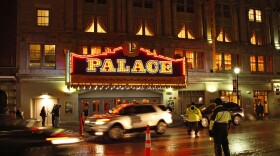Yet another legislative committee grappled this week with the best way to expand casino gaming in the state. The Finance Committee was considering a bill that would solicit bids for the building of a third casino in the state in an open competitive process.
It's the third legislative approach that's now under consideration.
There's another bill that would open competition under different terms, and a bill that would specifically license a partnership of Connecticut's two federally-recognized tribes to build a casino in East Windsor.
That latter approach is intended to allow the tribes to compete with a casino currently being built by MGM Resorts International in Springfield, Massachusetts, just 13 miles from East Windsor.
The tribes said the state stands lose millions of dollars annually if it goes the route of opening up a competitive process.
Dr. Clyde Barrow, who studies casino economics, and who’s been retained by the tribes, said the state would immediately lose the $260 million in slot revenue payments that currently comes annually from Foxwoods and Mohegan Sun.
"Not only would they no longer be obligated to make those payments -- federal law would prohibit them making those payments," he told lawmakers. That's because the tribes contend that allowing an outside commercial competitor to build a casino in the state would violate the compact under which the payments are made.
And Barrow went even further, saying the money the tribes save could be used against any competing facility that's licensed within the state.
"That gives them a $263 million war chest against that casino," he said. "Basically you would have a $1.1 billion casino competing against two casinos that don't pay taxes at all."
Most of the focus in alternative scenarios has been on opening a casino in southwestern Connecticut to draw in gamblers from New York.
But Barrow said the current prohibition on licensing a facility in New York City itself will expire in just a few years, leaving any southwest Connecticut facility hurting for business.
"It's going to end up as the Trump Taj Mahal of Connecticut," he warned. "It's going to be filing for bankruptcy within 30 days."
MGM Resorts International, which wants to bid on a casino in the state, contends that Connecticut will leave money on the table if it fails to go through a competitive bid process.
"If you're going to make the policy decision to have a third casino, you should do it in a way that maximizes jobs, that maximizes economic benefit to the state," said MGM legal counsel Uri Clinton.
"In a competitive environment, people put their best foot forward," he said. "The development agreement negotiated between East Windsor and the tribes guarantees a pitiful number of jobs."
Clinton denied that beginning now on a competitive bid process would cause unnecessary delay in creating a third casino, saying the state can set short deadlines for bidders.





